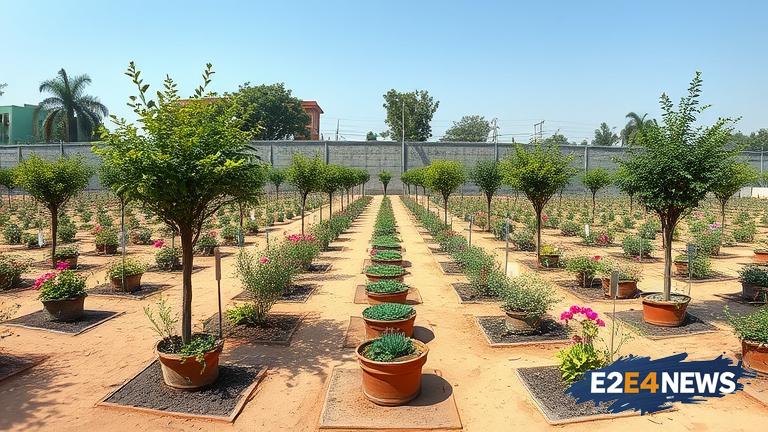In a bid to tackle the growing concern of air pollution, Islamabad’s first anti-smog nursery has been officially opened by Mohsin Naqvi. This innovative initiative is designed to provide a safe haven for plants to thrive in a controlled environment, free from the harmful effects of smog. The nursery is equipped with state-of-the-art technology and staffed by a team of expert horticulturists who will carefully monitor and maintain the health of the plants. The anti-smog nursery is a significant step towards mitigating the adverse effects of air pollution on the environment and public health. Air pollution has become a major concern in Pakistan, with many cities experiencing hazardous levels of smog, particularly during the winter months. The smog is caused by a combination of factors, including vehicular emissions, industrial pollution, and crop burning. The anti-smog nursery is part of a broader effort to promote sustainable development and reduce the city’s carbon footprint. The nursery will serve as a model for other cities in Pakistan, demonstrating the effectiveness of innovative solutions in addressing environmental challenges. The initiative has been widely praised by environmentalists and citizens alike, who see it as a positive step towards creating a healthier and more sustainable future. The anti-smog nursery is also expected to have a positive impact on the local economy, creating new job opportunities and stimulating growth in the horticulture sector. Furthermore, the nursery will provide a unique opportunity for research and development, allowing scientists to study the effects of smog on plant life and develop new strategies for mitigating its impact. The opening of the anti-smog nursery is a testament to the government’s commitment to addressing environmental concerns and promoting sustainable development. The initiative is also expected to raise awareness about the importance of protecting the environment and the need for collective action to address the challenges posed by air pollution. In addition to the anti-smog nursery, the government has also launched a number of other initiatives aimed at reducing air pollution, including the implementation of stricter emissions standards and the promotion of clean energy sources. The anti-smog nursery is a significant step towards creating a cleaner, greener, and healthier environment for the citizens of Islamabad and beyond. The nursery will also serve as a hub for community engagement and education, providing a platform for people to learn about the importance of environmental conservation and the simple steps they can take to make a positive impact. By providing a safe and healthy environment for plants to grow, the anti-smog nursery is helping to promote biodiversity and support the local ecosystem. The initiative is also expected to have a positive impact on the mental and physical health of citizens, who will benefit from the improved air quality and the opportunity to connect with nature. Overall, the opening of Islamabad’s first anti-smog nursery is a major milestone in the city’s efforts to address environmental challenges and promote sustainable development. The initiative is a shining example of the positive impact that can be achieved through innovative thinking and collective action. As the city continues to grow and develop, the anti-smog nursery will play a vital role in ensuring that the environment is protected and that the citizens of Islamabad can enjoy a healthy and sustainable future. The nursery is a beacon of hope for a cleaner, greener, and healthier tomorrow, and its impact will be felt for generations to come. The anti-smog nursery is a significant step towards achieving the United Nations’ Sustainable Development Goals, particularly Goal 11, which aims to make cities and human settlements inclusive, safe, resilient, and sustainable. By addressing the challenge of air pollution, the anti-smog nursery is helping to create a more sustainable and equitable future for all. The initiative is also expected to inspire other cities in Pakistan and around the world to take action to address environmental challenges and promote sustainable development.
